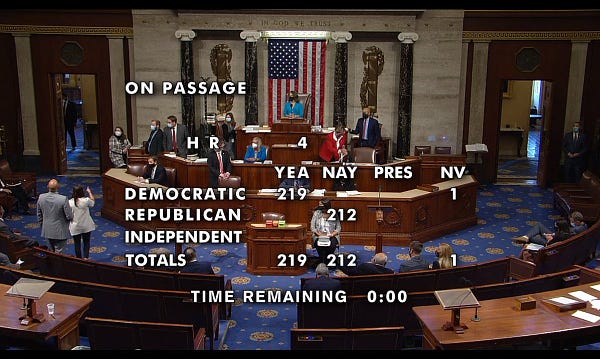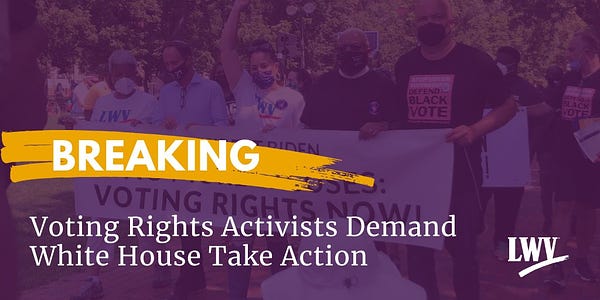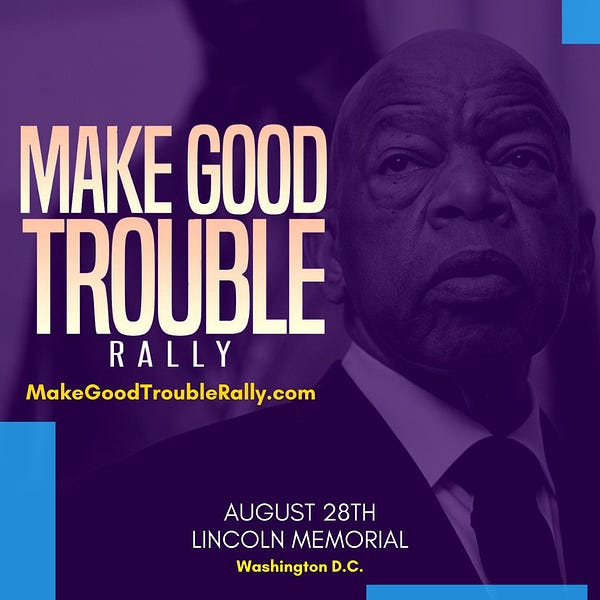What’s H.R. 4?
Dispatches on the For The People Act (Edition #28)
Welcome! This week, as promised, we will explore the John Lewis Voting Rights Advancement Act, an integral companion to (not a replacement for) the For The People Act.
Don’t forget to subscribe to this Substack for weekly updates about the movement to protect our democracy.
A Brief For The People Act Update: The Senate is still in recess, which means that senators have still not done their job of passing the For The People Act. However, as we already reported, Majority Leader Chuck Schumer pledged that voting rights would be the first order of business when the body returns and he scheduled another vote on the For The People Act in September. Grassroots activists are continuing to mobilize to pressure the Senate to reform the filibuster and pass the For The People Act.
In good news: The Voting Rights Advancement Act (H.R. 4) passed the House, with every Democrat voting in favor of it. No Republican voted for the bill. Much more on H.R. 4 below.
There are two critical events TOMORROW (Saturday, August 28th): First, there will be March on for Voting Rights rallies in Washington D.C. and other cities across the country. These events will build pressure for the For The People Act and the John Lewis Voting Rights Advancement Act. Second, Black Voters Matter and partners will be hosting a ‘Make Good Trouble’ rally at the Lincoln Memorial. For more information, check out their website here.
A quick read: Equal Citizens Fellow Mahnoor Imran and Executive Director Adam Eichen published a piece in Talking Points Memo criticizing the pundits who declare the For The People Act dead. Read more here.
What is the John Lewis Voting Rights Advancement Act?
The John Lewis Voting Rights Advancement Act (VRAA), or H.R. 4, restores and strengthens the Voting Rights Act of 1965, which has been consistently weakened by the Supreme Court.
Most notably, H.R. 4 would make “preclearance” operational again. From 1965 to 2013, states and counties that had a history of discriminating against voters of color in elections were required to get approval from the Justice Department (or D.C. federal court) before any changes to their election laws could go into effect. This practice was known as preclearance, and it was an incredibly successful way to preemptively stop discrimination.
However, in Shelby County v. Holder (2013), the Supreme Court (5-4) ruled that the formula that determined which jurisdictions were subject to preclearance was outdated and therefore unconstitutional. This was an absurd — and disastrous — ruling. In her dissent, Ruth Bader Ginsburg wrote, “Throwing out preclearance when it has worked and is continuing to work to stop discriminatory changes is like throwing away your umbrella in a rainstorm because you are not getting wet.” Within hours of the Shelby County case, a slew of states moved to restrict ballot access, disproportionately impacting people of color.
There was one glimmer of hope in this otherwise painful decision. Chief Justice Roberts suggested that if Congress wanted to maintain preclearance, it could pass an updated preclearance formula. H.R. 4, if passed, would do exactly that.
For years, there have been efforts to get a new preclearance formula through Congress, but it has always been blocked by Republican majorities. H.R. 4 represents the best chance yet to finally mitigate the harms of Shelby County.
H.R. 4 would also address two other terrible Supreme Court precedents.
First, it would reverse Brnovich v. DNC, a case that made it significantly harder to overturn anti-voter laws under Section 2 of the Voting Rights Act (the section that permits election laws and gerrymandered districts to be legally challenged if they are racially discriminatory). Under Brnovich, plaintiffs now have to prove “substantial and disproportionate burdens on minority voters” for a law to be struck down — a ridiculously high bar. H.R. 4 would strengthen Section 2 by getting rid of this narrow standard.
Second, H.R. 4 creates a new guideline for when courts can review voting laws. This provision is in direct response to the Purcell Principle, established by the Supreme Court in 2006, which dictates that federal courts should not adjudicate an election law close to an election — even if the court believe the law is unconstitutional. This was a major problem during the COVID-plagued elections in 2020; federal judges repeatedly refused to strike down discriminatory measures because it was too close to Election Day.
As Slate’s Mark Joseph Stern writes, H.R. 4 would, in almost all cases, forbid “both SCOTUS and the federal appeals courts from citing proximity to an election as an excuse to reinstate a voting restriction.”
But that’s not all. As Stern explains, the VRAA:
“bars the justices from considering ‘a state’s generalized interest in enforcing its enacted laws’ when deciding whether to block or permit an election regulation. And it instead compels the court to ‘give substantial weight to the public’s interest in expanding access to the right to vote.’ Under H.R. 4, the Supreme Court may not set aside a lower court decision expanding voting access unless it finds that burdens on the state ‘substantially outweigh’ the ‘public’s interest in expanding access to the ballot. The court may not set aside the district court’s factual findings unless they’re ‘clearly erroneous.’ And it must provide a ‘written explanation’ laying out its reasoning. Finally, H.R. 4 preempts the Supreme Court from issuing a future decision nullifying valid ballots, as Thomas, Alito, and Gorsuch tried to do in South Carolina. The justices ‘shall not order relief,’ the bill states, that abridges the right to vote of ‘any citizen who has acted in reliance’ on a lower court order that suspended voting restrictions.”
Why is it important?
The Voting Rights Act of 1965 (VRA) was transformational. It finally began to make real the promise of a multi-racial democracy in the United States. And ever since it became law, the VRA served as a mighty shield against racial discrimination in state and federal elections.
Not surprisingly, once the VRA was weakened, malicious actors exploited the opening, passing aggressive and racially discriminatory election laws. H.R. 4 would bring the shield back, and protect Americans against future anti-democratic laws. It addresses all the ways that conservative justices have gutted the VRA, and strengthens it against new legal challenges.
I have to be 100 percent clear, though. H.R. 4 is not a substitute for the For The People Act. Reinvigorating the Voting Rights Act would protect us against future actions by anti-democratic politicians. It would not undo the damages wrought since the Shelby case. Nor would it raise the democratic standards in all fifty states, ensuring that every American has the freedom to participate in our democracy. This is what the For The People Act would do: expand access to the ballot, reduce the role of money in politics, and fight against partisan gerrymandering.
The Senate must pass both the For The People Act and the John Lewis VRAA. We cannot wait any longer.
For more information about the differences between H.R. 1 and H.R. 4, watch this webinar with Profs. Carol Anderson, Guy Uriel-Charles, and Lawrence Lessig (which took place before the Brnovich decision).
What is the path ahead?
As mentioned, the House passed H.R. 4 this week.


However, as with H.R. 1, the VRAA does not have the support of enough Senate Republicans to overcome a filibuster. Currently, H.R. 4 has the backing of all 50 Senate Democrats and one Senate Republican (Alaska’s Lisa Murkowski).
I won’t mince words. The VRAA will only pass if we reform the filibuster. If we succeed in fixing the filibuster, the VRAA and the For The People Act can become law.
Recap of Recent Actions:
Grassroots activists are working hard, as always, to build pressure to reform the filibuster and to keep democracy in the news.
On Tuesday, the League of Women Voters and People For The American Way held a “No More Excuses, Voting Rights Now!” rally outside of the White House.


On Thursday, the Poor People's Campaign held a Mass Moral Motorcade on Manchin in West Virginia.
Throughout the week, grassroots activists have been holding a variety of virtual actions to spread the word about Saturday’s marches and rally.
Upcoming Events:
As explained above, there are two important events happening tomorrow in D.C. and across the country. We highly recommend that you attend, as long as you can do so in a COVID-safe manner. (The organizations hosting these events are trying very hard to take necessary safety precautions.)
On Saturday, August 28th, there will be March on for Voting Rights rallies in Washington D.C. and in other cities across the country. These events will build pressure for the For The People Act and the John Lewis Voting Rights Advancement Act. Please try to attend one near you. Check out a press hit on these “Marches” here.
Also on Saturday, August 28th, Black Voters Matter and partners will be hosting a ‘Make Good Trouble’ rally at the Lincoln Memorial. For more information, check out their website here.


Also don’t forget, you can always find more events to attend on the Declaration for American Democracy website here.
More events are popping up all the time, so don’t forget to subscribe to hear about exciting future events.
In the News:
Derrick Johnson, the national president of the NAACP, writes in USA Today about the need to pass the For The People Act and the John Lewis VRAA. Johnson explains the urgent need for action and outlines a few examples of anti-voter legislation sweeping the country.
Sarah Katz writes in The Atlantic about how the wave of restrictive voting laws will disproportionately impact people with disabilities. When voting access expanded during the pandemic, Americans with disabilities voted at a much higher rate and reported fewer difficulties in casting a ballot. States are now working to revoke pandemic-era voter provisions, which will make the aforementioned progress short-lived.
The Washington Post’s Editorial Board criticizes Ohio Republicans for attacking the right to vote. They conclude, “Congress should have no higher priority than passing a federal voting rights law that curtails these anti-democratic efforts across the map.”
In Good News:
The Washington Post reports that a judge in North Carolina ordered the restoration of voting rights for over 50,000 formerly incarcerated individuals. GOP leaders are planning to appeal the ruling to a higher court.
Don’t forget to keep your friends, family, and colleagues in the loop by sharing this Substack with them.
Social Media Roundup:
Let’s be frank: there are A LOT of tweets, posts, and general conversation about the For The People Act. In this section, we give you an overview of the tweets and media you really need to see.





More Ways to Help!
We are entering possibly one of the most critical moments for American democracy since the Voting Rights Act of 1965. We need all the help we can get to push the For The People Act over the finish line! Here are more ways to join the fight to protect American democracy:
Call your senators and tell them that you support reforming the filibuster to pass H.R. 1. You can find your senators’ phone numbers, as well as where they stand on the filibuster, using our handy filibuster tracker!
Common Cause, Center for Common Ground, RepresentUs, and End Citizens United are organizing regular phone banks in support of the For the People Act. This is a great opportunity to spread the word about H.R. 1 and help constituents contact their Senators in support of the bill. Check them out here, here, here, and here.
Stacey Abrams’ Fair Fight Action is hosting Hot Call Summer. Plug into their actions here.
Common Cause also hosts regular text banks on Wednesdays and Saturdays. Sign up to join them here.
You can also text DEMOCRACY to 33339 to receive a daily text message reminder to call your senators in support of S.1.
League of Women Voters can also help you contact the White House here.
Write a letter to the editor in your local paper sharing your support of H.R. 1 and urging your Senators to pass it. Not sure how to write a letter to the editor? Reach out to us at info@equalcitizens.us and we can help!
Share our newsletter, our podcast, the articles included above, and the resources on H.R. 1 below on social media and tell your friends why you support #ForThePeopleAct
Relevant Resources:
Here are a few resources on the “For the People Act” if you have questions:
Equal Citizens launched a filibuster tracker, so you can see where your senator stands on the filibuster. It also includes their phone numbers and their Twitter handles, so you can get in touch with them directly and push them to support filibuster reform!
The Brennan Center for Justice created a wonderful guide to H.R. 1. Check it out here. They also created an in-depth report about racism and disenfranchisement due to incarceration.
Recently, Equal Citizens launched a polling new webpage: H.R. 1 is Popular. This page chronicles the strong public support for the For The People Act. It also explores the polling on individual provisions of the bill and opinions about reforming the filibuster. Check it out here.
The Brennan Center also published a report on why H.R. 1 brings us closer to an inclusive democracy. Check it out here.
Here is the link to the House website on the For the People Act.
Flood social media with these awesome graphics about the For the People Act!
There is a lot of misinformation about H.R. 1, and the amount of misinformation will only grow as the fight heats up. That’s why it’s more important than ever to make sure everyone has all the facts on the bill - here is an article from Media Matters that can help you fact check. Additionally, the Brennan Center published a piece to help you decipher fact from fiction. Check it out here.
More About Me:
Kevin Rissmiller is a fellow at Equal Citizens and a Goodwin-Niering Scholar at Connecticut College majoring in Government and exploring sociology, economics, and applied statistics. In his free time, you will find him at Dunkins or (pre-pandemic) playing ultimate frisbee. Connect with him on LinkedIn.
If you want more updates on H.R. 1 from Kevin, then subscribe here!


